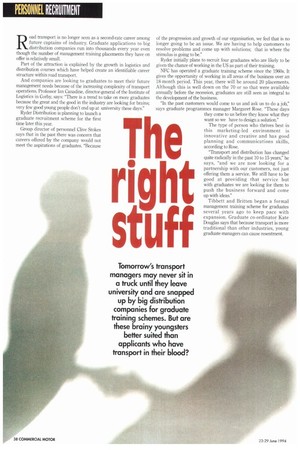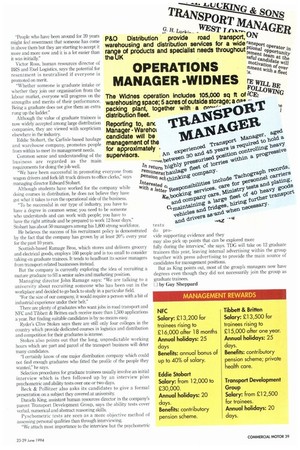rig St ht uff
Page 40

Page 41

If you've noticed an error in this article please click here to report it so we can fix it.
Tomorrow's transport managers may never sit in a truck until they leave university and are snapped up by big distribution companies for graduate training schemes. But are these brainy youngsters better suited than applicants who have transport in their blood?
Road transport is no longer seen as a second-rate career among future captains of industry. Graduate applications to big distribution companies run into thousands every year even though the number of management training placements they have on offer is relatively small.
Part of the attraction is explained by the growth in logistics and distribution courses which have helped create an identifiable career structure within road transport.
And companies are looking to graduates to meet their future management needs because of the increasing complexity of transport operations. Professor Ian Canadine, director-general of the Institute of Logistics in Corby, says: "There is a trend to take on more graduates because the great and the good in the industry are looking for brains; very few good young people don't end up at university these days."
Ryder Distribution is planning to launch a graduate recruitment scheme for the first time later this year.
Group director of personnel Clive Stokes says that in the past there was concern that careers offered by the company would not meet the aspirations of graduates. "Because of the progression and growth of our organisation, we feel that is no longer going to be an issue. We are having to help customers to resolve problems and come up with solutions; that is where the stimulus is going to be."
Ryder initially plans to recruit four graduates who are likely to be given the chance of working in the US as part of their training.
NFC has operated a graduate training scheme since the 1960s. It gives the opportunity of working in all areas of the business over an 18-month period. This year, there will be around 20 placements. Although this is well down on the 70 or so that were available annually before the recession, graduates are still seen as integral to the development of the business.
"In the past customers would come to us and ask us to do a job," says graduate programmes manager Margaret Rose. "These days they come to us before they know what they want so we have to design a solution."
The type of person who thrives best in this marketing-led environment is innovative and creative and has good planning and communications skills, according to Rose.
"Transport and distribution has changed quite radically in the past 10 to 15 years," he says, and we are now looking for a partnership with our customers, not just offering them a service. We still have to be good at providing that service but with graduates we are looking for them to push the business forward and come up with ideas."
Tibbett and Britten began a formal management training scheme for graduates several years ago to keep pace with expansion. Graduate co-ordinator Kate Douglas says that because transport is more traditional than other industries, young graduate managers can cause resentment. "People who have been around for 20 years might feel resentment that someone has come in above them but they are starting to accept it more and more now and it is a lot easier than it was initially."
Victor Ross, human resources director of BRS and Exel Logistics, says the potential for resentment is neutralised if everyone is promoted on merit.
"Whether someone is graduate intake or whether they join our organisation from the labour market, everyone will progress on the strengths and merits of their performance. Being a graduate does not give them an extra rung up the ladder."
Although the value of graduate trainees is now widely accepted among large distribution companies, they are viewed with scepticism elsewhere in the industry.
Eddie Stobart, the Carlisle-based haulage and warehouse company, promotes people from within to meet its management needs.
Common sense and understanding of the business are regarded as the main requirements for doing the job well.
"We have been successful in promoting everyone from wagon drivers and fork-lift truck drivers to office clerks," says managing director Edward Stobart_ Although students have worked for the company while doing courses in distribution, he does not believe they have got what it takes to run the operational side of the business. "To be successful in our type of industry, you have to have a degree in common sense; you need to be someone who understands and can work with people; you have to have the right attitude and be prepared to work 12-hour days." Stobart has about 50 managers among his 1,800 strong workforce.
He believes the success of his recruitment policy is demonstrated by the fact that the company has grown by at least 20% every year for the past 10 years.
Scottish-based Ramage Bros, which stores and delivers grocery and electrical goods, employs 160 people and is too small to consider taking on graduate trainees. It tends to headhunt its senior managers from transport-related businesses instead.
But the company is currently exploring the idea of recruiting a mature graduate to fill a senior sales and marketing position.
Managing director John Ramage says: "We are talking to a university about recruiting someone who has been out in the workplace and decided to go back to study in a particular field.
"For the size of our company, it would require a person with a bit of industrial experience under their belt."
There are plenty of graduates who want jobs in road transport and NFC and Tibbett & Britten each receive more than 1,500 applications a year. But finding suitable candidates is by no means easy.
Ryder's Clive Stokes says there are still only four colleges in the country which provide dedicated courses in logistics and distribution and competition for their graduates is intense.
Stokes also points out that the long, unpredictable working hours which are part and parcel of the transport business will deter many candidates.
"I certainly know of one major distribution company which could not find enough graduates who fitted the profile of the people they wanted," he says.
Selection procedures for graduate trainees usually involve an initial interview which is then followed up by an interview plus psychometric and ability tests over one or two days.
Beck & Pollitzer also asks its candidates to give a formal presentation on a subject they covered at university.
Daniela King, assistant human resources director in the company's parent Transport Development Group, says the ability tests cover verbal, numerical and abstract reasoning skills.
Pyschometric tests are seen as a more objective method of assessing personal qualities than through interviewing.
"We attach most importance to the interview but the psychometric tests do pro vide supporting evidence and they may also pick up points that can be explored more fully during the interview," she says. TDG will take on 12 graduate trainees this year, leaving internal advertising within the group together with press advertising to provide the main source of candidates for management positions.
But as King points out, most of the group's managers now have degrees even though they did not necessarily join the group as graduate trainees.
U by Guy Sheppard
















































































































